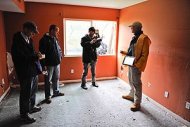In fact, you'll have to get a home inspection to meet mortgage lenders' requirements before you buy. But not all licensed inspectors will thoroughly inspect and report on your potential home's defects.
So before you hire the first home inspector you find on Google or whoever your Realtor or lender suggests, do your homework. It's acceptable to interview a home inspector before you decide to drop $300 or more on the inspection fee.
Here are the seven most important questions to ask before you schedule a home inspection:
1. Are you a member of a professional inspection organization?
Reputable home inspectors will be members of one of these organizations: the National Association of Home Inspectors, the American Society of Home Inspectors or the International Association of Certified Home Inspectors. Many states also have statewide associations, which are acceptable alternatives.
Each organization has certification and licensing procedures and requires members to follow procedural and ethical standards when conducting home inspections. Membership to one of these organizations doesn't guarantee a home inspector is an expert, but you should probably rule out any inspectors who aren't members of a respected professional organization.
2. What's your background?
The best home inspectors are typically those who have experience in the building industry. You want to work with an inspector who knows what's inside the walls of your home and understands the basics of local building codes and requirements. (Note: A home inspector will not be able to tell you if every single plumbing, electrical and/or structural aspect of your potential home is up to the latest codes. For this, you'll need a more specialized inspection by a licensed plumber, electrician or contractor.)
Background is especially important if you're planning to purchase an older home, as inspectors may need to look for problems in older homes that are uncommon in newer properties. So if you're buying an older home -- or a fixer-upper -- find an inspector with a background in inspecting similar homes.
3. How much experience do you have?
It's OK to work with a rookie home inspector who has a background in construction or home repair. But be sure you hire someone who has, at the very least, undergone extensive training -- or who will have the assistance of a more experienced inspector during the inspection.
4. How long will the inspection take?
On average, a home inspection should take two to three hours to perform. If you're dealing with a large home, a fixer-upper or an older home, the inspection should take even longer. Don't hire someone who promises to be in and out within an hour or two, as this is too short a time to thoroughly inspect a home.
5. What will you inspect?
Keep in mind that it's not a home inspector's job to inspect things that can't be seen. The inspection won't reveal any wiring problems hidden behind drywall or any mold problems under the shower tiles.
With that said, an inspector should evaluate every possible visible place in your home, including the roof, basement and attic. And the home inspector should be in physical shape to access these places, even if a ladder or flashlight is required.
An inspector should also look at things such as the water heater, furnace and electrical box. Again, the inspector may be unable to tell you if your home's systems are up to local codes. But the professional should have enough knowledge to inform you if the systems are safe or in need of major repairs.
6. Can I attend the inspection?
A refusal to this simple request is a red flag. A home inspection is a fabulous opportunity to learn about your home and talk about any possible repairs that may be needed. A good inspector will take you along on the inspection, if you wish. A great inspector will talk you through everything he sees.
7. What kind of inspection report do you offer?
Most inspectors will provide a report within 24 hours. It's important to be sure the inspector's reporting style will meet the requirements of your lender as well as your own personal preferences. Ask to see samples of their previous home inspections if you aren't sure.
Of course, you'll also want to ask about the inspector's fees and schedule. But before you get to those, find the right inspector by asking these seven questions.
Source:
Abby Hayes

No comments:
Post a Comment